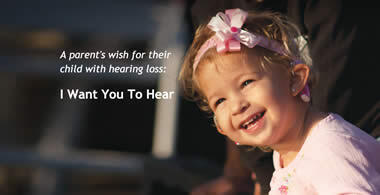New online resource available to help parents of a child with hearing loss
|
Renee Oehlerking Cochlear Americas 303-264-2104 roehlerking@Cochlear.com |
Centennial, Colo., (April 4, 2016) — One to six in 1,000 children in the United States are born with severe to profound hearing loss.1 For a parent, that diagnosis can be life altering, and they are in need of help, information and support. Today, Cochlear Limited (ASX: COH), the global leader in implantable hearing solutions, introduces IWantYouToHear.com as part of its ongoing commitment to parents seeking treatment options for their child’s severe to profound hearing loss.
For many parents with a child who has received a hearing loss diagnosis, the wish for their child is immediate and clear: “I want you to hear.” They want their child to hear the birds and their favorite songs, learn to develop speech and language, and most of all, they want their child to hear them say “I love you.”
“Learning your child has hearing loss is stressful. It’s important for parents to know they are not alone and we’re here to be a partner through their journey,” said Patti Trautwein, AuD, Vice President, Marketing for Cochlear Americas. “Parents are looking for easily accessible resources to educate themselves on hearing loss treatment options like cochlear implants. IWantYouToHear.com has been developed to help parents through their child’s journey to better hearing—from the day they learn of a hearing loss diagnosis to rehabilitation. We want them to hear too.”
The new website allows parents to navigate their child’s hearing loss with insight from fellow parents and pediatric recipients themselves. The online resource helps parents understand how hearing works and what the signs are of hearing loss. It investigates possible hearing loss solutions and educates readers on how the Cochlear™ Nucleus® 6 Implant System may help them, including highlighting innovative features like Cochlear True Wireless™ technology.
Research and over two decades of experience have demonstrated the benefits of cochlear implants for children, including improved development of speech and language skills, improved quality of life and improved educational outcomes.2 The Nucleus 6 Implant System is also designed to help children hear better in noisy environments like daycare and school.
"Cochlear implants have been life changing for my son,” said Jennifer Hoffner, mother of 7-year-old Patrick, Nucleus Implant System recipient. “My deaf son, who was bilaterally implanted at one year of age, was testing at the language level of an 8 year old when he was 4. He is now able to fully participate in conversations and activities with his friends and family, and there is no substitute when I hear him say, ‘I love you so much, Mommy!’”
“Making the decision for our daughter to get a cochlear implant was very difficult, but we knew this was the only way to maximize her options for later in life,” said Charlene Su, mother of 17-month-old Natalie, Nucleus Implant System recipient. “We wanted our daughter to be able to communicate with the world around her without any barriers.”
As part of its promise to help a child ‘Hear now. And always,’ Cochlear designs its implant systems to provide access to future technology without the need for additional surgery. As the industry leader in research and development, Cochlear strives to deliver advanced technology which can last a child's entire life. Having helped more than 400,000 individuals around the globe enjoy the gift of sound, Cochlear strives to be a partner for a child’s lifetime of hearing.
To access all the available resources for parents of children with hearing loss, visit IWantYouToHear.com. A new resource guide supporting IWantYouToHear.com will also be available on the website; it provides an even deeper look at the information provided online.
About Cochlear Implants
Cochlear implants are a proven medical option for infants as young as 12 months old with profound hearing loss in both ears, children aged two and older with severe-to-profound hearing loss, and adults with moderate-to-profound hearing loss in both ears. They are electronic devices that bypass damaged hair cells in the inner ear, or cochlea, and stimulate the hearing nerve directly.
According to the National Institute on Deafness and Other Communication Disorders, roughly 58,000 adults and 38,000 children have received cochlear implants in the United States.3 Nearly two million Americans could be candidates for cochlear implant technology, but only 5 percent of patients who can benefit have been treated.4,5
About Cochlear Limited (ASX: COH)
Cochlear is the global leader in implantable hearing solutions. The company has a global workforce of 2,800 people and invests more than AUS$100 million a year in research and development. Products include cochlear implants, bone conduction and acoustic implants, which are designed to treat a range of moderate to profound types of hearing loss.
Over 400,000 people of all ages, across more than 100 countries, now hear because of Cochlear.
www.cochlear.com/us
# # #
References:
- American Speech-Language-Hearing Association. The Prevalence and Incidence of Hearing Loss in Children [Internet]. Available from: http://www.asha.org/public/hearing/Prevalence-and-incidence-of-Hearing-Loss-in-Children/
- Novak MA, Firszt JB, Rotz LA, et al. Cochlear implants in infants and toddlers. Ann Otol Rhino Laryngol Suppl 2000;185:46-49.
- National Institute on Deafness and Other Communication Disorders. Cochlear Implants [Internet]. Available from: https://www.nidcd.nih.gov/health/cochlear-implants
- Blanchfield, B.B., et. al. (2001). The severely to profoundly hearing-impaired population in the United States: Prevalence estimates and demographics. JAAA. 12, 183-189.
- Internal Cochlear Data on File. June, 2009.



